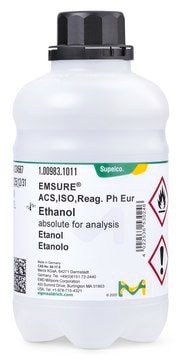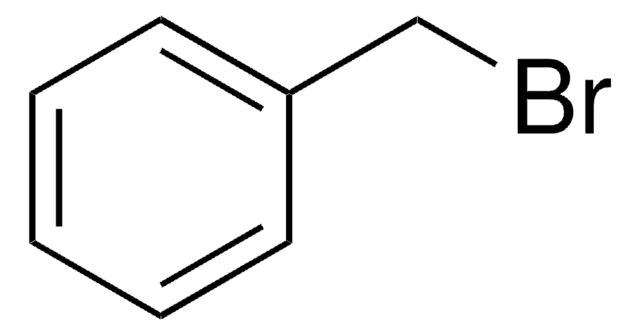Kluczowe dokumenty
L010002
Acetonitrile
Synonim(y):
ACN, Cyanomethane, Ethyl nitrile, Methyl cyanide
About This Item
Polecane produkty
gęstość pary
1.41 (vs air)
Poziom jakości
ciśnienie pary
72.8 mmHg ( 20 °C)
typ
for DNA synthesis
Formularz
liquid
temp. samozapłonu
973 °F
granice wybuchowości
16 %
warunki przechowywania
dry at room temperature
zanieczyszczenia
≤30 ppm water content (Karl Fischer)
kolor
clear
współczynnik refrakcji
n/D 1.342-1.346
n20/D 1.344 (lit.)
bp
81-82 °C (lit.)
mp
−45 °C (lit.)
rozpuszczalność
water: soluble (completely)
gęstość
0.786 g/mL at 25 °C (lit.)
Format
neat
ciąg SMILES
CC#N
InChI
1S/C2H3N/c1-2-3/h1H3
Klucz InChI
WEVYAHXRMPXWCK-UHFFFAOYSA-N
Szukasz podobnych produktów? Odwiedź Przewodnik dotyczący porównywania produktów
Inne uwagi
Hasło ostrzegawcze
Danger
Zwroty wskazujące rodzaj zagrożenia
Zwroty wskazujące środki ostrożności
Klasyfikacja zagrożeń
Acute Tox. 4 Dermal - Acute Tox. 4 Inhalation - Acute Tox. 4 Oral - Eye Irrit. 2 - Flam. Liq. 2
Kod klasy składowania
3 - Flammable liquids
Klasa zagrożenia wodnego (WGK)
WGK 2
Temperatura zapłonu (°F)
35.6 °F - closed cup
Temperatura zapłonu (°C)
2.0 °C - closed cup
Wybierz jedną z najnowszych wersji:
Masz już ten produkt?
Dokumenty związane z niedawno zakupionymi produktami zostały zamieszczone w Bibliotece dokumentów.
Global Trade Item Number
| SKU | GTIN |
|---|---|
| L010002-200L | 4061838155054 |
Nasz zespół naukowców ma doświadczenie we wszystkich obszarach badań, w tym w naukach przyrodniczych, materiałoznawstwie, syntezie chemicznej, chromatografii, analityce i wielu innych dziedzinach.
Skontaktuj się z zespołem ds. pomocy technicznej








